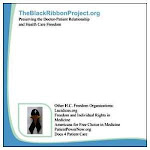Centuries old, the Hippocratic Oath is considered by most to be the fundamental ethical creed of medicine.
Central to the oath is the following promise of the physician to the patient:
"I will follow that system of regiment, which according to my ability and judgment, I consider for the benefit of my patients."
This promise is severely undermined by all third-party payment systems. When the third party is a private insurance company, at least patients voluntarily agree to the limitations placed on them and their physicians under the insurance contract --although the extent of contractual freedom varies widely from state to state.
When the third party is the government, and the restrictions and mandates hold the penalty of law, the voluntary nature of the agreement is changed to one based primarily upon coercion. The more the government mandates, the less the physician is able to legally offer advice and treatment based solely on his "ability and judgment." Instead, physicians are increasingly required to substitute their judgement and advice for the judgment of politicians and regulators.
.







